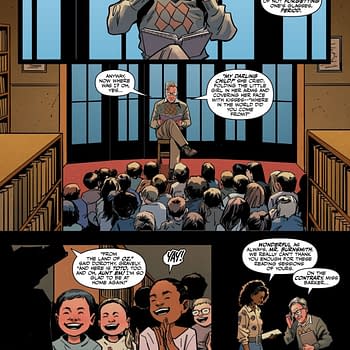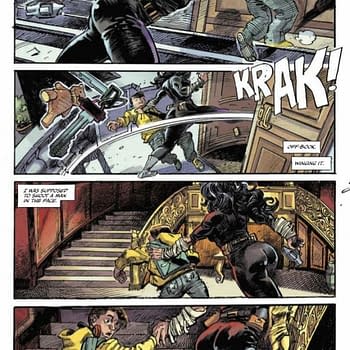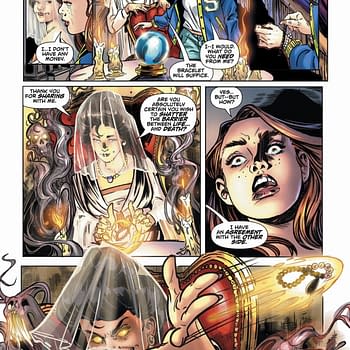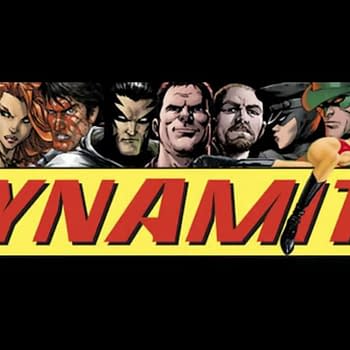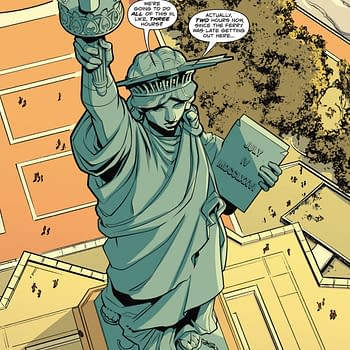Posted in: Comics, Recent Updates | Tagged: Allison Baker, amanda conner, Anina Bennett, Claire Hummel, Comics, entertainment, jimmy palmiotti, Kiala Kazebee, Lumberjanes, Paul Guinan, san diego comic con, women in comics, wonder woman
Well, Not All Men: Why We Still Need Women In Pop Culture Panels
Liz Hey writes from San Diego Comic Con:
There's a certain bitterness that comes in every female Comic Con veteran's response to the concept of Women-in-Comics panels. We're almost always one of the following: tired of being treated like a complete anomaly and different from our male counterparts, exhausted of hearing the same self-explanatory questions over and over again ("what's it like to be a woman in comics?" –spoiler alert: it's like being in comics while also happening to be a woman), or frustrated that there still needs to be separate panels for women just to keep representation at Con even. However, if there's anything we can continue to take from the most recent panels, it's that progress is being made, but not everyone is making it at once and that deserves some discussion.
The "Female Heroes: Then and Now" panel at the most recent San Diego Comic Con did set itself apart from most other WiC sessions by acting as a statement on the necessity of the panels themselves. It began with a short retrospective look at where con culture has come from in regards to the subject courtesy of the block's moderator, Heartbreakers creator Anina Bennett who recalled first taking part in some of the female heroes panels over twenty years ago. She remarked that even having a line waiting to get in was only a recent development for the genre. For this, Bennett and the other panel members including her Heartbreakers co-creator and husband Paul Guinan, along with Jimmy Palmiotti (Painkiller Jane), Kiala Kazebee (Vaginal Fantasy), Allison Baker (Monkeybrain Comics), and Claire Hummel (Bioshock: Infinite) attribute not just the culture's standalone progress but the internet as well.

You could say it was that concept that inspired the rest of the session as it quickly evolved into a town forum format, inviting guests to voice their most pressing concerns with female representation in various pop culture industries. The blatant open ended offering of the microphone was something I hadn't seen before in my time doing these types of panels. Usually there's at least a vague constraint like talking about just representation in comics or working within the industry, but because this was about all popular culture questions touched everything from Game of Thrones to tech development.

This exchange led into another issue that panelists were eager to discuss. Even those with genuinely good intentions are capable of making mistakes; even minorities can have faux paus and offend other groups. Allison Baker admitted to having been called out earlier in her career for making a very much Westernized rendition of an Indian steampunk character. The best and only thing to do in such a situation, she suggests, is to accept the criticism and apologize. Those unwilling to concede to criticism from hurt parties are what hold mediums back.
Blatant denial or forfeit of blame seems to be a particularly important subject currently as witnessed by a new growing trend. Since when did feminism become the new F-word? We've had female celebrities deny the title in interview after interview but surely our progressive industry would be a bit braver with our heroes and creators. And yet, as mentioned at the panel, in a recent interview with Wonder Woman's new husband and wife creative team, they wanted her to be "strong, not a feminist but…"* as if the two had to be immediately distinguished from one another.
It's for all these reasons that despite my and the rest of the reluctant fangirl population's best wishes that we do still need these panels in 2014. It's no longer about just pointing out terrible gender ratios or general mistreatment of women in pop culture; it's a matter of constructing new goals that push our progress even further. Even with advancements made, certain topics are only becoming less black and white when it comes to what is truly helping the cause, so having a friendly trade of criticism is a good way to work things out. People, (males in particular) shouldn't be afraid of these panels as if they were roasts of all the men in the industry, but rather they should see them as your convention season checkups. Praise does also occur at these sorts of gatherings as well. As Kazebee put it, "Feminism doesn't mean we hate men…well, not all men."
*This quote was taken from Jimmy Palmiotti at the panel and not from the mentioned interview directly. Palmiotti was describing the interview from memory so the phrasing may not be exact.










